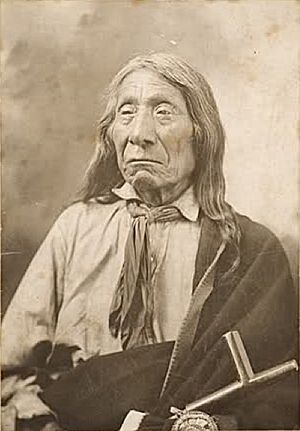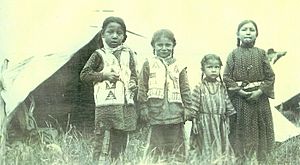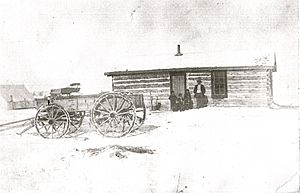Felix Flying Hawk facts for kids
Felix Flying Hawk (born 1881, died 1944) was an Oglala Lakota man. He was known for being a Wild Wester, an interpreter, a photographer, and a rancher. Felix was the only son of Chief Flying Hawk and Goes Out Looking.
A story called "The Story of Felix Flying Hawk: Rustler Victim" was written about him in 1943 by Major Israel McCreight. This story shared how Felix was once wrongly arrested for stealing his own horses. It showed the great honesty and good character of Native Americans. Felix Flying Hawk's oldest son, David Flying Hawk, also traveled with his grandfather Chief Flying Hawk as a performer in Wild West shows.


Felix Flying Hawk traveled across the United States with his father, Chief Flying Hawk. They were part of Buffalo Bill's famous Wild West show. Felix was a very good photographer. His most famous picture is of the respected Oglala Lakota Chief Red Cloud, taken in 1905.
The story "The Story of Felix Flying Hawk: Rustler Victim" was published in 1943. Felix owned a small ranch in Manderson-White Horse Creek, South Dakota. In the early 1900s, he was wrongly arrested for stealing his own horses. This story highlights a special meeting with Major Israel McCreight. It shows the honesty and strong character of Native American people.
McCreight shared a conversation he had about Felix with a famous American writer named Elbert Hubbard. McCreight showed Hubbard a letter from Felix. In the letter, Felix apologized for being late to repay a small loan. He explained how he had found the letter, which had been delayed for months. Hubbard was very impressed by Felix's honesty. He said he wanted to write a new story like his famous "A Message to Garcia" about Felix. Sadly, Hubbard passed away before he could write it.
Contents
David Flying Hawk: A Performer's Life
David Flying Hawk was the oldest son of Felix Flying Hawk. David was a performer in Wild West shows. He traveled with his grandfather, Chief Flying Hawk.
A Wild Ride with "King Tut"
In 1924, David Flying Hawk performed in Rhode Island. He had a memorable moment with a horse named "King Tut." This horse was very wild. He was named King Tut because the real King Tut's tomb had just been discovered.
David was a bronc rider and part of an Indian dance group. During a show in Providence, David was called to ride King Tut right after his dance. He didn't have time to change. So, he rode the wild horse in his full dance costume. He wore fringed buckskin clothes, feathers, and bells.
When the gate opened, King Tut went wild. The bells jingled, and the feathers flapped. The horse bucked hard. David stayed on for a few jumps before he was thrown off. The crowd loved it! They thought it was a special trick. It was a very funny moment at the rodeo. King Tut was later sold and continued to be a famous bucking horse for many years.
David's Difficult Time
On March 25, 1927, Chief Flying Hawk wrote to Major Israel McCreight for help. He reported that David had been arrested and jailed for horse stealing. McCreight remembered Felix's similar experience of being wrongly jailed. He knew this was another example of unfair treatment towards Native Americans.
Despite McCreight's efforts, David spent almost a year in jail. This was very hard on David's family. Without his help, Felix's farm struggled. Felix wrote to McCreight, saying his family's farm was ruined that year because David was in jail. He also shared the sad news that David's sister, who was 20, had passed away.
McCreight found that David was accused of stealing ponies. He had gotten two ponies in a trade but hadn't changed their brands. McCreight felt this was another example of unfairness against Native Americans. David Flying Hawk later became a leader. He was the Treaty Chairman for the South Dakota and Seven Camp Fires. In this role, he worked to hold the United States Government accountable for broken treaty promises.
Felix Flying Hawk and Major Israel McCreight
Felix Flying Hawk wrote many letters for his father, Chief Flying Hawk. He also wrote to McCreight from 1912 until 1944. These letters are now part of the "Major Israel McCreight Archives." You can find them at the Du Bois Area Historical Society.
Images for kids
 | Valerie Thomas |
 | Frederick McKinley Jones |
 | George Edward Alcorn Jr. |
 | Thomas Mensah |





